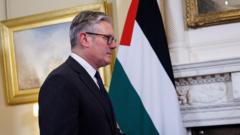Is the UK Finally Recognizing Palestine as a State?

Published: 2025-09-21 14:00:21 | Category: technology
The UK government has officially recognised the state of Palestine, marking a significant step towards a two-state solution aimed at achieving peace in the Middle East. This announcement comes amid ongoing violence and humanitarian crises in the region, underscoring the urgent need for resolution and support for both Israeli and Palestinian communities.
Last updated: 23 October 2023 (BST)
Key Takeaways
- The UK has formally recognised the state of Palestine.
- Sir Keir Starmer emphasised the importance of a viable two-state solution.
- Concerns about the humanitarian crisis in Gaza were voiced.
- Efforts to release hostages held by Hamas were highlighted.
- The UK aims to build consensus for peace in the region.
Background of the Recognition
The formal recognition of Palestine by the UK follows a longstanding debate over the two-state solution, which envisions a peaceful coexistence of Israel and Palestine as independent states. This announcement by Prime Minister Sir Keir Starmer signals a renewed commitment to diplomatic efforts aimed at resolving one of the world's most protracted conflicts.
For decades, the Israeli-Palestinian conflict has resulted in significant loss of life, deep-seated animosity, and a persistent cycle of violence. The recognition of Palestine is seen not just as a diplomatic gesture, but as part of a broader strategy to stabilise a region fraught with tension and unrest.
Sir Keir Starmer's Announcement
In his announcement, Sir Keir Starmer articulated a vision for peace that includes both a secure Israel and a viable Palestinian state. He stated, "At the moment, we have neither." This acknowledgment of the current unsatisfactory state of affairs highlights the urgency of finding solutions that address the needs and aspirations of both peoples.
Humanitarian Concerns
Starmer's speech drew attention to the dire humanitarian situation in Gaza, where ongoing conflict has led to widespread devastation. He condemned the Israeli government's military actions, which have reportedly resulted in tens of thousands of deaths, including many civilians.
Starmer also mentioned the plight of hostages held by Hamas, stressing the emotional toll on families in the UK and Israel. "The hostages must be released immediately, and we will keep fighting to bring them home," he declared, reinforcing the UK's commitment to humanitarian principles.
The Role of Hamas and Security Concerns
Addressing the role of Hamas, Starmer labelled the group a "brutal terror organisation" whose actions are fundamentally opposed to the vision of a two-state solution. He made it clear that any future negotiations would exclude Hamas, which he described as having "no future, no role in government, no role in security." This statement seeks to draw a clear line between the ambitions for peace and the actions of groups that perpetuate violence.
International Context and Support
Starmer noted that the UK joins over 150 countries in recognising Palestine, which he described as a pledge to both Palestinian and Israeli peoples for a better future. This international recognition is significant, as it may encourage other nations to join the UK in acknowledging Palestinian statehood and advancing diplomatic efforts.
The UK government's stance is part of a broader international framework that aims to reinvigorate peace talks and address the humanitarian needs of those affected by the conflict. Starmer emphasised the importance of building consensus with regional leaders to establish a practical roadmap for peace.
Moving Towards a Two-State Solution
The announcement marks a pivotal moment in UK foreign policy, aligning with the Labour Party's manifesto commitment to recognising Palestinian statehood. Starmer articulated the need for a reform of the Palestinian Authority and a series of steps that would transition from a ceasefire in Gaza to meaningful negotiations.
Starmer's call for a two-state solution highlights the necessity of addressing the root causes of conflict and fostering an environment conducive to dialogue. However, he acknowledged the challenges posed by ongoing violence and settlement expansion in the West Bank, which threaten to undermine the peace process.
Humanitarian Aid and Support
In response to the ongoing humanitarian crisis, the UK has begun evacuating sick and injured children from Gaza for treatment in the NHS. Starmer reiterated the need for increased humanitarian support, calling on the Israeli government to lift restrictions and allow aid to flow freely into Gaza.
The situation remains complex, and many observers are wary of the potential for further escalation. While the UK government’s recognition of Palestine may provide hope for some, the reality on the ground is fraught with challenges that must be addressed promptly and effectively.
Conclusion: A Call for Unity and Hope
Starmer’s announcement underscores a commitment to peace and security for both Israelis and Palestinians. He called for a collective effort to combat hatred and division, emphasising that a peaceful future hinges on unity and collaboration. The release of hostages, an end to violence, and a renewed commitment to a two-state solution are all essential for moving forward.
As the UK navigates its role in this complex geopolitical landscape, the hope remains that recognition of Palestine will serve as a catalyst for renewed dialogue and ultimately, a lasting peace in the region. The challenge ahead is substantial, but the pursuit of peace is a collective responsibility that must be embraced by all stakeholders involved.
FAQs
What does the UK’s recognition of Palestine mean?
The UK’s recognition of Palestine signifies a commitment to supporting the establishment of an independent Palestinian state alongside Israel, aiming for a peaceful two-state solution.
Why is a two-state solution important?
A two-state solution is seen as a viable way to ensure security and self-determination for both Israelis and Palestinians, thereby addressing the long-standing conflict and promoting stability in the region.
What are the humanitarian implications of the current conflict?
The ongoing conflict has led to severe humanitarian crises, particularly in Gaza, where many civilians face dire living conditions, lack of medical care, and inadequate access to food and water.
How does this recognition impact UK-Israel relations?
The recognition of Palestine by the UK may complicate its relationship with Israel, as it signals a shift towards acknowledging Palestinian statehood, but it also emphasises the UK's commitment to peace in the region.
What steps is the UK taking to support humanitarian efforts?
The UK government has initiated the evacuation of sick and injured children from Gaza and is advocating for increased humanitarian aid, urging Israel to lift restrictions on aid delivery.



